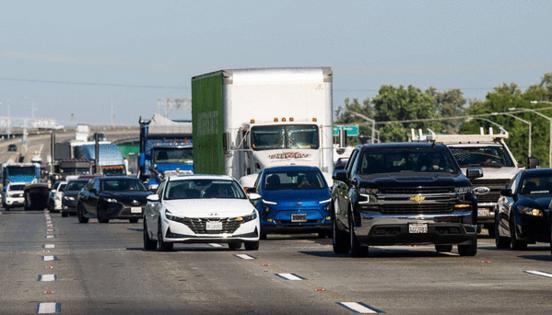Top auto lobby warns states of 'unachievable' California emissions rules
Published in Automotive News
WASHINGTON — The nation's top automotive lobbying group on Wednesday encouraged states to retreat from pledges to adopt California's influential, strictest-in-the-nation tailpipe emission regulations.
The Alliance for Automotive Innovation, which represents all major U.S. automakers except for Tesla Inc., said in an open memo that "it's gonna take a miracle" for states to comply with the regulations requiring electric vehicles to make up 100% of new light-duty vehicle sales by 2035.
California's emission standards are crucial to the national automotive picture because they can exceed federal requirements and states can voluntarily adopt identical regulations. Currently, 11 other states and the District of Columbia — collectively accounting for about one-third of the U.S. population — have pledged to copy the Golden State's latest standards.
"You can't get ahead of the customer. The customer is in charge," said John Bozzella, the group's president and CEO.
Bozzella's concern alludes to slowing growth for U.S. electric vehicle sales as consumers express hesitancy over cost and charging infrastructure and as automakers struggle to turn EV profits and reduce their dependence on China for key components.
California and environmental groups have claimed, however, that its new Advanced Clean Cars II standards are reasonable and achievable as the United States seeks to reduce its greenhouse gas emissions.
"Automakers have been well aware of these processes and have been in conversations throughout the creation of ACC II," Kathy Harris, director of the Natural Resource Defense Council's clean vehicles program, told The Detroit News in October.
"Despite being in the room, they were not opposed to any of these regulations. They have had lots of time to be prepared," Harris added. "It's also key to know ... that under the current ACC I program, no automaker has ever been out of compliance."
Outgoing Democratic President Joe Biden has not yet granted California its required waiver to enact the standards, but official sign-off is likely to arrive soon.
CARB did not immediately respond to a request for comment.
In an October email, agency spokesperson David Clegern said: "Automakers have been part of the Advanced Clean Cars process from the beginning. CARB’s extensive public process has also included numerous industry experts, academics, scientists and engineers, as well as the public. The regulations are designed with the understanding that OEMs want to build cars that sell."
He also acknowledged other states' ability to adopt CARB rules but noted that the regulations and targets are designed specifically with California in mind.
The Golden State — and its environmental regulator, the California Air Resources Board — has long set its own vehicle emissions standards enabled by waivers from the federal government. The state gained that authority thanks to a provision in the Clean Air Act, originally passed in 1970.
Clean Air Act Amendments in 1977 paved the way for other states to adopt California's standards, as enforced by their own state lawmaking and regulatory bodies.
As the auto alliance memo describes the arrangement: "States can either follow the federal program (about 70 percent of the country does) or adopt the California program (the other 30 percent). One or the other. There’s no option to choose something in between.
"The 11 states following California’s lead aren’t accountable to California or the EPA. They’re part of a program that is an unaccountable, unachievable regulatory wormhole."
The U.S. Environmental Protection Agency under Biden set new rules requiring automakers to slash air pollution but did not explicitly mandate the sale of EVs as the solution for doing so.
California's latest auto regulations do require EV sales. Fully or partially electrified models will need to represent more than one-third of new vehicle sales in CARB-pledged states by model year 2026 or 2027. The number rises to 100% by 2035.
Most states are far from reaching their near-term requirements, and those requirements ultimately fall to automakers.
There are three ways, the auto alliance explained in its memo, companies can reach their requirements: Selling more EVs, selling fewer total vehicles, and buying credits from EV-focused automakers like Tesla and Rivian Automotive Inc. that overcomply.
The first would require significant EV sales growth in a short time. In New York, for example, automakers would have to sell about 309,000 electric models in 2026, assuming overall new auto sales grow 5% from 2023 levels. Automakers in the state sold about 76,000 EVs that year.
The second, the memo suggested, would cause prices to rise — as was the case during and after the COVID-19 pandemic.
The third would benefit the likes of Tesla, which has earned billions of dollars from state and federal-level emissions credit trading over the past decade.
"The ‘California’ issue will dominate electrified vehicle policy (and politics) in the year ahead," the auto alliance predicted in its memo.
The standards will put the CARB-following states at odds with President-elect Donald Trump and his vows to end policies he has labeled as EV mandates, continuing a regulatory "ping pong" that the auto alliance group said impacts both automakers and consumers.
The incoming administration will likely challenge California's authority in court, as it did during Trump's first term. The U.S. Supreme Court could also strike down California's waiver authority through a case it has repeatedly relisted on its docket but has not yet formally considered.
Amid the regulatory fights to come, the auto alliance said state policymakers have two choices: "Pull their states from the program or double-down and make major EV investments and try to make the regulations achievable."
The full memo is available on the trade group's website.
©2024 www.detroitnews.com. Visit at detroitnews.com. Distributed by Tribune Content Agency, LLC.








Comments